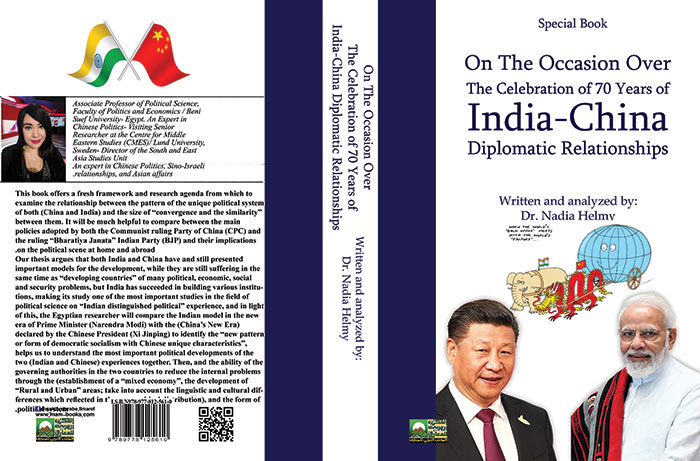كناب للدكتورة نادية حلمي بمناسبة مرور ٧٠ سنة على العلاقات الدبلوماسية بين الصين والهند
موقع الصين بعيون عربية ،
خاص من القاهرة:
كتاب جديد للدكتورة/ نادية حلمي مهدى لحكومتي الصين والهند وللرئيس الصيني (شى جين بينغ) والرفاق في الحزب الشيوعي الحاكم، ورئيس الوزراء الهندي (ناريندرا مودي) باللغة الإنجليزية بمناسبة مرور ٧٠ سنة على العلاقات الدبلوماسية بين الصين والهند
الدكتورة نادية حلمى- أستاذ العلوم السياسية جامعة بنى سويف- والخبيرة في الشئون السياسية الصينية والآسيوية- والعلاقات الصينية – الإسرائيلية- مدير وحدة دراسات جنوب وشرق آسيا

الكتاب بعنوان: “رؤية مقارنة بين “الإشتراكية الإستشارية الصينية وبناء الدولة: بالتركيز على النظرية الصينية لرئيس جمهورية الصين الشعبية (شي جين بينغ) في (الإشتراكية ذات الخصائص الصينية لعصر جديد”، ومقارنتها مع التجربة الهندية في الديمقراطية التشاركية الفيدرالية البرلمانية وبناء الدولة: بالتركيز على الانتخابات التشريعية فى عام 2019
يقدم هذا الكتاب إطاراً فريداً لتجربة الدولتين، ويضع من وجهة نظر مقارنة تأسيس جدول أعمال بحثى لدراسة العلاقة بين نمط النظام السياسى الفريد لكلّ من (الصين والهند)، ودراسة حجم التقارب والتشابه بينهما.
واعتمدت الأكاديمية المصرية المعروفة الدكتورة/ نادية حلمي على عمل مقارنة بين السياسات الرئيسية التي إعتمدها كلاً من الحزب الشيوعي الحاكم فى الصين وحزب “بهاراتيا جاناتا” فى الهند، والتأثيرات السياسية لقراراتهما في الداخل والخارج.
لذلك سوف نتعلم من خلال هذا الكتاب بعض جوانب ظاهرة “الديمقراطيات التشاركية والإستشارية والإشتراكية في الصين والهند” من خلال فهم مفاهيم الديمقراطيات الإشتراكية والتشاركية، و”مظاهر الطبيعة المعقدة” للمجتمعات التعددية “الصينية والهندية”، والعقبات الرئيسية التي تواجه نظمهما السياسية.
وتقدم أطروحة الدكتورة/ نادية حلمى نموذج الهند، على إعتبار كونها تجربة نموذجية هامة وفريدة لتطوير “التجربة الديمقراطية” في واحدة من أكبر البلدان في العالم الثالث، إستناداً إلى تبنيها النظرية “الديمقراطية التشاركية”، والتي تعنى بمشاركة جميع مواطنيها وأقلياتها في عمليات “صنع القرار” السياسي في الدولة الهندية، مع إتاحة الفرصة كاملة للمواطنين الهنود في إختيار ممثليهم في البرلمان الهندي.
وترى الباحثة المصرية الدكتورة نادية حلمي، أنه في حين أن كلاً من بلدان الهند والصين لا تزالان تعانيان من عدد “المشاكل السياسية والاجتماعية والاقتصادية والثقافية” الداخلية، إلا أنهما نجحتا في إنشاء نموذج سياسى متكامل وتفعيل سياسات مخطط لها من قبل الدولتين في كافة المقاطعات ومناطق الريف والحضر، وأقاليم تركز الأقليات المختلفة، ونجاحهما في بناء مؤسسات راسخة تدعم سياسات الدولة في الإصلاح والتنمية في كافة أرجاء البلاد، مما يجعل من دراسة التجارب التنموية للهند والصين واحدة من أهم الدراسات في مجال النظم السياسية التنموية المتميزة.
وفي ضوء ذلك، إهتمت الدراسة البحثية بعقد مقارنة حول (الديمقراطية التشاركية) كتجربة فريدة من نوعها في المجتمع الهندي، مع التركيز على “نمط نجاح تجربة الإنتخابات التشريعية” في مايو 2019، باعتبارها أحدث تجربة عملية تطبيقية لكيفية ممارسة مواطني الهند لديمقراطتيهم التعددية الفريدة، مقارنةً مع التجربة الصينية، والنظرية السياسية الصينية الجديدة، والتي أعلنها الرئيس الصيني (شى جين بينغ)، لتحديد “نمط جديد أو شكل صيني جديد من أشكال الإشتراكية الديمقراطية ذات الخصائص الصينية في العصر الجديد”، بما يساعدنا على فهم أهم التطورات السياسية من منظور مقارن لأهم تجربتين تنمويتين حول العالم للصين والهند.
ثم قارنت الدراسة مدى قدرة السلطات الحاكمة في البلدين على التصدي لكافة التحديات التي واجهتهما من خلال الحد من المشاكل الداخلية لهما، مثل: نجاحهما في إنشاء نمط “إقتصاد مختلط”، وتطوير المناطق “الريفية والحضرية”، مع مراعاة الاختلافات اللغوية والثقافية، والتي تنعكس في التوزيع الجغرافى، وشكل النظام السياسي للدولتين.
A new book for Dr.Nadia Helmy, the Egyptian expert in Chinese Politics and Asian affairs about China and India, presented to the Chinese and Indian governments, Chinese President (Xi Jingping), Comrades in the Communist Party of China and the Indian Prime Minister (Narendra Modi) in English, on the occasion of passing (70 Years of India-China Diplomatic Relations), entitled:
“A comparative view on the “Chinese Consultative Socialism” and state-building: Focusing on the Chinese President Xi Jinping’s New Theory of “Socialism with Chinese Characteristics for a New Era”, and Indian “Parliamentary Federal Participatory Democracy” and state-building: Focusing on the Legislative elections in 2019”.
Dr.Nadia Helmy, Associate Professor of Political Science, Beni Suef University in Egypt. An expert in Chinese Politics, Sino-Israeli relationships, and Asian affairs, Director of South and East Asia Unit
This book offers a fresh framework and research agenda from which to examine the relationship between the pattern of the unique political system of both (China and India) and the size of “convergence and the similarity” between them. It will be much helpful to compare between the main policies adopted by both the Communist ruling Party of China (CPC) and the ruling “Bharatiya Janata” Indian Party (BJP) and their implications on the political scene at home and abroad. So we will learn about some aspects of the phenomenon of “participatory, consultative and Socialist democracies of China and India” by understanding the concepts of Socialist and participatory democracies, the “manifestations of the complex nature” of the “multi-national Indian and Chinese” society, the main mutual obstacles to their political systems. Our thesis argues that India has and still presented an important model for the development of the “democratic experience” in one of the largest countries in the third world, based on “participatory democracy” and the participation of all its citizens and minorities in political “decision-making” processes, and the selection of its representatives in Parliament, while both India and China models are still suffering as “developing countries” of many political, economic, social and security problems, but India has succeeded in building various institutions, making its study one of the most important studies in the field of political science on “Indian distinguished political” experience, and in light of this, the comparison of (participatory democracy) as a unique experience in the Indian society and focusing on the “pattern of the legislative elections” in May 2019, compared with the (China’s New Era) declared by the Chinese President (Xi Jinping) to identify the “new pattern or form of democratic socialism with Chinese unique characteristics”, helps us to understand the most important political developments of the two (Indian and Chinese) experiences together. Then, and the ability of the governing authorities in the two countries to reduce the internal problems through the (establishment of a “mixed economy”, the development of “Rural and Urban” areas; take into account the linguistic and cultural differences which reflected in the geographical distribution), and the form of political system

